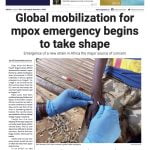On November 2, the Greek Government – through its Coordination Unit at the UN -organized a high-level event chaired by George Kremlis, a principal advisor to Greece’s prime minister, that focused on the need for tackling the effects of the climate crisis to protect the planet’s cultural and natural heritage.
Europea
During the event, Greece’s ministers of Culture and Sport Lina Mendoni and Environment and Energy George Amyras; the president of the UN’s Sustainable Development Solutions Network Jeffrey Sachs, as well as ministers and representatives from 10 nations, experts on climate change, and the heads of international organizations that included: the International Council on Monuments and Sites (ICOMOS) President Teresa Patricio; Secretariat Director of the Group on Earth Observations (GEO) Yana Gevorgyan; Sneska Quaedvlieg-Mihailovic, Secretary-General of Europa Nostra; the Founder and President of the World Human Forum Alexandra Mitsotakis proposed recommendations regarding the policy, mechanisms and tools for the protection of cultural and natural monuments.
The discussion was further enhanced by the evaluation of replies to a questionnaire by those countries that support the initiative. The report was presented on behalf of the Coordination Unit, which was led by Evangelos Gerasopoulos, the research director of Athens’ National Observatory.

The participants unanimously recognized the need to integrate culture into climate action by highlighting good practices, monument vulnerability criteria and appropriate methodology, as well as the effective use of digital tools and innovative practices to support measures that will prevent and improve the international community’s resilience against the effects of climate change.
In addition to those key points, they also agreed on the need to further promote, through international campaign
Each of the participants committed to attending a preservation summit in Athens next spring.






